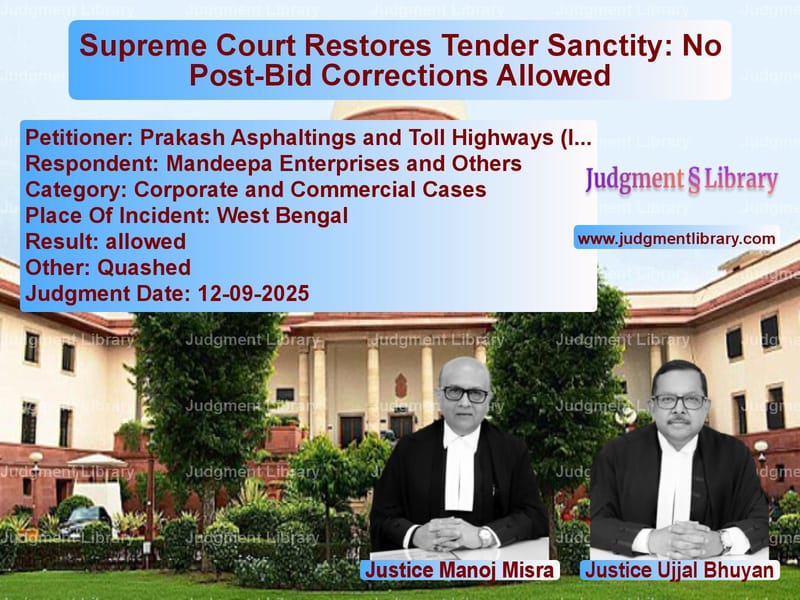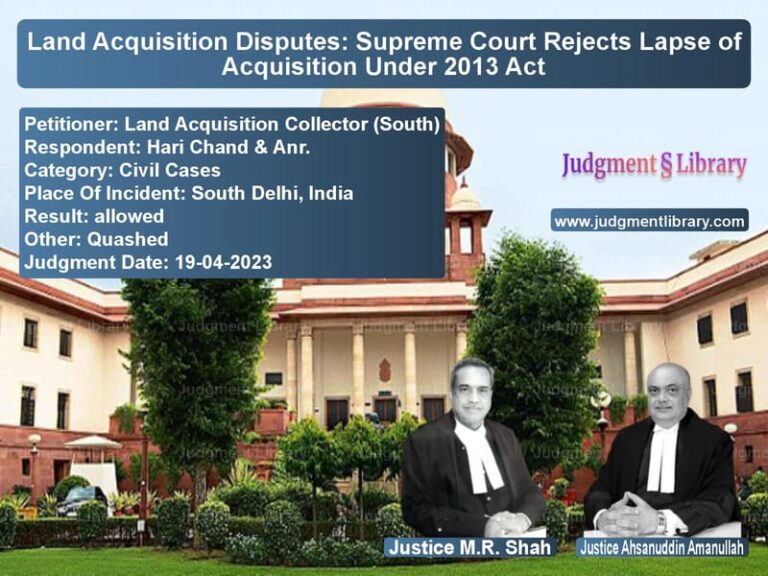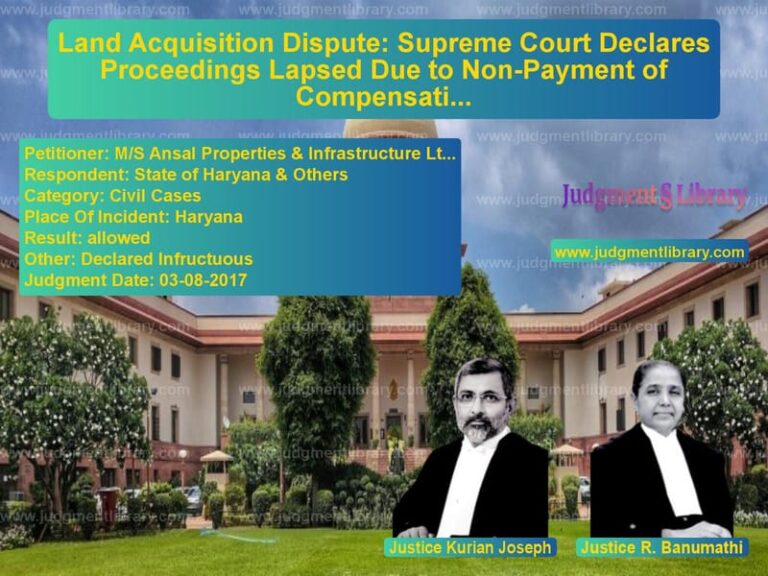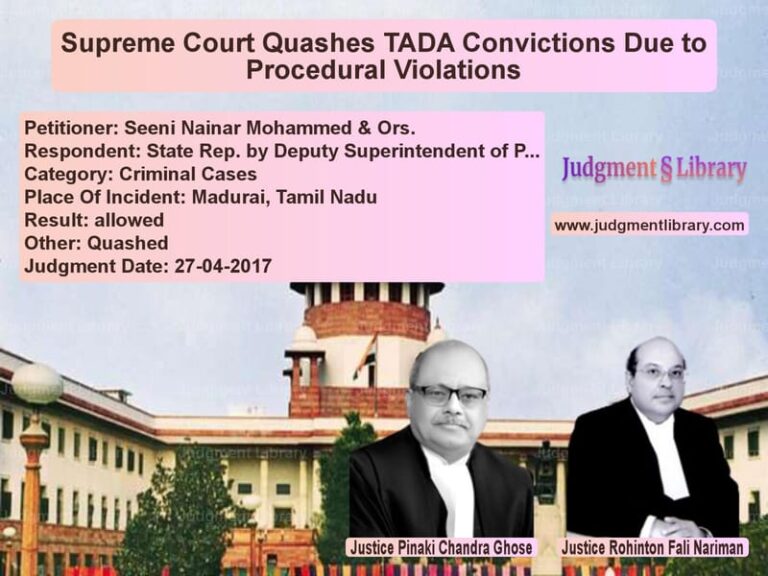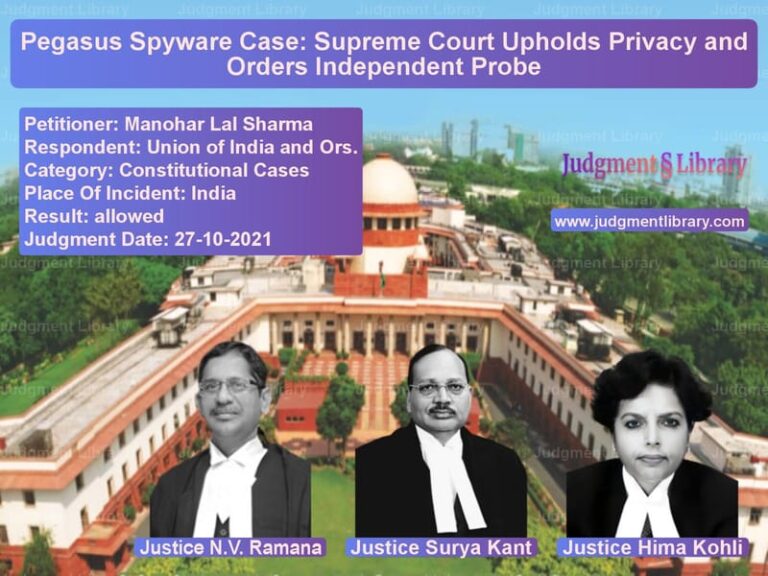Supreme Court Restores Tender Sanctity: No Post-Bid Corrections Allowed
In a significant judgment that reinforces the sanctity of public tender processes, the Supreme Court of India has set aside a Calcutta High Court order that allowed a bidder to correct its financial bid after the bidding process was completed. The case involved a road user fee collection contract in West Bengal where Mandeepa Enterprises had quoted Rs. 9,72,999.00 instead of the intended amount for the entire 1095-day contract period.
The dispute began when the West Bengal Public Works Department invited bids for Road User Fee collection services in October 2023. Seven bidders participated, including Prakash Asphaltings and Toll Highways (India) Limited and Mandeepa Enterprises. After technical evaluation, four bidders were found qualified, and when financial bids were opened, Prakash Asphaltings emerged as the highest bidder (H1) with Rs. 91,19,00,000.00, while Mandeepa Enterprises was the lowest (H4) with Rs. 9,72,999.00.
Following the bid opening, Mandeepa Enterprises claimed it had made an inadvertent error by quoting a per-day rate instead of the total contract amount. The company requested the tendering authority to treat its quoted figure as a daily rate and compute the total as Rs. 106,54,33,905.00 for 1095 days, which would make it the highest bidder by approximately Rs. 15 crores. The tendering authority rejected this request, stating it would impeach the sanctity of the tender process.
Mandeepa Enterprises then approached the Calcutta High Court, where a Single Judge dismissed their petition, observing that “Bona fides cannot be attributed to the petitioner; rather, the petitioner was grossly negligent” and that “if such an opportunity is to be given to a particular bidder, the same would upset the entire tender process and would make the tender process opaque and arbitrary.”
However, in a surprising turn, a Division Bench of the High Court allowed Mandeepa’s appeal, directing the authorities to evaluate their BOQ by treating the amount as per-day rate and compute it for the entire contract period. The Division Bench held that the tendering authority had “sufficient leverage and play in the joints to seek for any clarification or information during the entire evaluation process.”
Prakash Asphaltings, which had not been made a party in the High Court proceedings despite being the highest bidder, approached the Supreme Court challenging this decision. The appellant argued through senior counsel Mr. Kavin Gulati that “if the opportunity as sought for by respondent No. 1 is allowed, the same would upset the entire tender process” and that “the Division Bench had interpreted Clause 5B(v) of the Instructions to Bidders erroneously.” He emphasized that “Clause 4(g) of the tender conditions makes it clear that change of Bill of Quantity (BOQ) would not be accepted under any circumstances.”
Mandeepa Enterprises, represented by Mr. Anurag Soan, contended that “the mistake committed by respondent No. 1 was a bona fide one and completely unintentional” and that “there is a material difference between a total revision of price by quoting a new amount and clarifying the existing price.” They argued that public interest would be served by accepting their corrected bid since it would bring additional revenue of about Rs. 15 crores to the state exchequer.
The State of West Bengal, represented by Ms. Nandini Sen Mukherjee, supported Prakash Asphaltings’ position, stating that “the sanctity of the entire tender process would be affected in case the corrections suggested by the Division Bench are sustained” and that “permitting an unsuccessful bidder to raise grievance after opening of the financial bid would set a bad precedent.”
The Supreme Court, in its judgment delivered by Justices Manoj Misra and Ujjal Bhuyan, extensively examined the tender conditions and legal precedents. The Court noted that Clause 4(g) of the tender document specifically stated that “any change in the template of BOQ will not be accepted under any circumstances” and that the BOQ template clearly indicated that the amount was to be quoted for 1095 days.
The Court made several crucial observations about tender processes and judicial intervention. Quoting from its earlier decision in Jagdish Mandal vs. State of Orissa, the Court reiterated: “Judicial review of administrative action is intended to prevent arbitrariness, irrationality, unreasonableness, bias and mala fides. Its purpose is to check whether choice or decision is made ‘lawfully’ and not to check whether choice or decision is ‘sound’. When the power of judicial review is invoked in matters relating to tenders or award of contracts, certain special features should be borne in mind. A contract is a commercial transaction. Evaluating tenders and awarding contracts are essentially commercial functions. Principles of equity and natural justice stay at a distance.”
The Court further emphasized that “the words used in the tender documents cannot be ignored or treated as redundant or superfluous: they must be given the due meaning and their necessary significance” and that “constitutional courts must defer to this understanding and appreciation of the tender documents unless there is mala fides or perversity in the understanding or appreciation or in the application of the terms of the tender documents.”
Addressing the issue of natural justice, the Court held that “appellant was a necessary party to the proceedings before the High Court instituted by respondent No. 1 being the H1 bidder” and that “non-impleadment and consequential non-hearing of the appellant by the High Court, has vitiated the impugned judgment and order.”
The Court also provided important guidance on the concept of public interest in tender matters, stating: “The expression ‘public interest’ in the arena of commercial transactions cannot and should not be confined to any straight jacket definition. While benefit or accrual of more revenue to the public exchequer is certainly an important aspect, equally important, if not more, is adherence to the rules and conditions of tender; sanctity of the tender process being paramount and should be maintained at all cost.”
In its concluding remarks, the Supreme Court set aside the High Court’s judgment and restored the tender process, allowing the authorities to finalize the contract based on the original bid evaluation. The Court’s decision reinforces that bid documents must be prepared with utmost care and that post-bid corrections cannot be permitted, as they would undermine the fairness and transparency essential to public procurement processes.
This judgment serves as an important reminder to all participants in public tender processes about the critical importance of diligence in bid preparation and the limited scope for judicial intervention in commercial decisions of tendering authorities. The Supreme Court’s firm stance on maintaining the sanctity of tender processes ensures that all bidders compete on a level playing field and that public procurement remains transparent and fair.
Petitioner Name: Prakash Asphaltings and Toll Highways (India) Limited.Respondent Name: Mandeepa Enterprises and Others.Judgment By: Justice Manoj Misra, Justice Ujjal Bhuyan.Place Of Incident: West Bengal.Judgment Date: 12-09-2025.Result: allowed.
Don’t miss out on the full details! Download the complete judgment in PDF format below and gain valuable insights instantly!
Download Judgment: prakash-asphaltings-vs-mandeepa-enterprises-supreme-court-of-india-judgment-dated-12-09-2025.pdf
Directly Download Judgment: Directly download this Judgment
See all petitions in Contract Disputes
See all petitions in Corporate Compliance
See all petitions in unfair trade practices
See all petitions in Commercial Arbitration
See all petitions in Judgment by Manoj Misra
See all petitions in Judgment by Ujjal Bhuyan
See all petitions in allowed
See all petitions in Quashed
See all petitions in supreme court of India judgments September 2025
See all petitions in 2025 judgments
See all posts in Corporate and Commercial Cases Category
See all allowed petitions in Corporate and Commercial Cases Category
See all Dismissed petitions in Corporate and Commercial Cases Category
See all partially allowed petitions in Corporate and Commercial Cases Category

